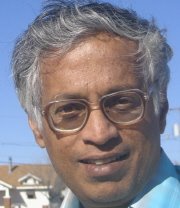Are humans really special?
Dr. K.Rohiniprasad
The earliest life forms to have evolved on the earth about 3.9 billion years ago, were simple bacteria-like organisms. They were characterized by the absence of a nuclear membrane and by DNA that is not organized into chromosomes. About 2 billion years ago other types of single-celled organisms evolved whose cells contained a distinct membrane-bound nucleus. More complex creatures such as invertebrates (without spinal cord) and marine vertebrates started evolving only some 600 million years ago. Neural complexity came later with the evolution of reptiles, mammals and humans.
While this ‘progress’ of evolution is a fact, Stephen Jay Gould argues that it may be wrong to see humans as predictably dominant in the hierarchy of life. He says that the first living things arose at the lower limit of life’s conceivable, preservable complexity. But it is important to remember that bacterial life forms have been stable from the very beginning and continue to remain so today and even in the future. Even as humans consider themselves to be superior, there is no denying the fact that bacteria represent a great success story of their own in life’s pathway. They occupy a wider domain of environments and span a broader range of biochemistries than any other life form. They are adaptable, indestructible and astonishingly diverse. Gould reminds us that the E.Coli cells in the intestines of each human exceeds the number of humans that has ever lived on this planet!
Organisms adapt to the environment and are constrained by physical principles. For example, gravity allows the largest animals in the sea (whales) to be bulkier than the largest ones on land (elephants), which, in turn are larger than the largest flying creatures. These laws of nature do not show any preference or validation of “rightness” for any particular life form that can be in the form of mushrooms, flowers or animals.
We imagine that life evolves from simplicity towards complexity, ignoring the fact that simpler life forms such as parasites have proliferated in various environments advertising themselves as “evolutionary success stories”. Sigmund Freud is reported to have remarked that the history of science has knocked human arrogance off one pedestal after another of our own self-importance. Copernicus first removed the earth from the centre of our planetary system while Darwin proved that we have descended from an animal world. Freud himself explored the unconscious and exploded the myth of a fully rational mind.
Humans are characterised by a complex nervous system and consciousness. In spite of all the evidence to the contrary, Gould says that we continue to consider the evolution of human consciousness as something inevitable and predictable. It does not occur to us that there are other pathways to success as life continues to evolve on this planet. We tend to think of ourselves as the culmination of biological evolution and life’s highest expression of perfection without any scientific justification.
For the last 150 years artists have painted pictures showing the ‘progress’ of life from invertebrates to fishes, reptiles, dinosaurs, mammals and finally to humans. Gould reminds us that even as humans evolved, invertebrates, for example, never vanished nor stopped evolving. Similarly fishes have been thriving even after one branch turned amphibian and adapted to land. The ‘parochial’ attitude of self-importance humans attribute to themselves has no scientific basis at all.


2 Comments:
What is termed a scientific basis? I mean, if some professional biologist wanted to argue that humans are indeed the most advanced species, what would he/she have prove? Is that even a meaningful thing to do in the scientific community?
What is special anyway? Your essay could mean every species is special in its own way and I couldn't agree more. It could also mean that nothing is special. I see your point where you are comparing the ego based on the geocentric theory with that based on our supposed position at the pinnacle of evolution. While the numbers go against that, don't you think that argument has some value? (unless we find out that E.coli are secretly controlling our brains and commanding us to make enough scientific progress to argue reasonably about these things in the first place :-)
I just went over your other posts. I really hope everyone reads them.
I wasn't implying that humans are special in an "Intelligently Designed" kind of way. I thought your essay meant that humans had no remarkable characteristics at all and should humbly keep the population of E.coli in mind. I read one of your other posts where you mentioned "Humans probably represent the pinnacle of neural complexity." while other micro-organisms succeeded at the numbers game. That was all I was hoping to see.
Very nice (and delightfully sarcastic (పొట్ట కోసం చదివే చదువులూ, సైన్సూ ఒంటబట్టే అవకాశం ఎలాగూ లేదు కనక అదంతా మరిచిపోయన "విద్యాధికులు" అన్నిటినీ ఆడించే పవరు గురించి ఊహలల్లుకుంటూ ఉంటారు.)) blog!
Post a Comment
<< Home